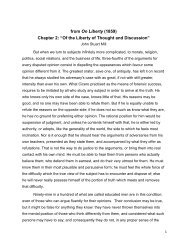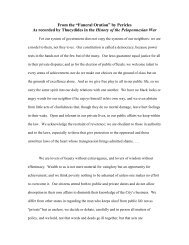Rousseau_contrat-social
Create successful ePaper yourself
Turn your PDF publications into a flip-book with our unique Google optimized e-Paper software.
guide us.<br />
Indeed, as soon as a question of particular fact or right arises on a<br />
point not previously regulated by a general convention, the matter<br />
becomes contentious. It is a case in which the individuals concerned are<br />
one party, and the public the other, but in which I can see neither the<br />
law that ought to be followed nor the judge who ought to give the<br />
decision. In such a case, it would be absurd to propose to refer the<br />
question to an express decision of the general will, which can be only<br />
the conclusion reached by one of the parties and in consequence will be,<br />
for the other party, merely an external and particular will, inclined on<br />
this occasion to injustice and subject to error. Thus, just as a<br />
particular will cannot stand for the general will, the general will, in<br />
turn, changes its nature, when its object is particular, and, as<br />
general, cannot pronounce on a man or a fact. When, for instance, the<br />
people of Athens nominated or displaced its rulers, decreed honours to<br />
one, and imposed penalties on another, and, by a multitude of particular<br />
decrees, exercised all the functions of government indiscriminately, it<br />
had in such cases no longer a general will in the strict sense; it was<br />
acting no longer as Sovereign, but as magistrate. This will seem<br />
contrary to current views; but I must be given time to expound my own.<br />
It should be seen from the foregoing that what makes the will general is<br />
less the number of voters than the common interest uniting them; for,<br />
under this system, each necessarily submits to the conditions he imposes<br />
on others: and this admirable agreement between interest and justice<br />
gives to the common deliberations an equitable character which at once<br />
vanishes when any particular question is discussed, in the absence of a<br />
common interest to unite and identify the ruling of the judge with that<br />
of the party.<br />
From whatever side we approach our principle, we reach the same<br />
conclusion, that the <strong>social</strong> compact sets up among the citizens an<br />
equality of such a kind, that they all bind themselves to observe the<br />
same conditions and should therefore all enjoy the same rights. Thus,<br />
from the very nature of the compact, every act of Sovereignty, i.e.,<br />
every authentic act of the general will, binds or favours all the<br />
23











